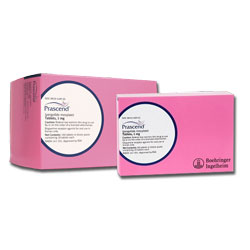Prascend Tablets
The first and only medicine available in the US to treat PPID (equine Cushing's disease)
Veterinarian Prescription (Rx) RequiredFree Shipping on orders over $75
Low Price Match Guarantee
- Pergolide Mesylate
- Fully approved by the FDA
- Dopamine receptor agonist for oral use in horses only
Description
PRASCEND is the first and only medicine available in the US that is fully approved by the FDA to treat pituitary pars intermedia dysfunction (more commonly called PPID or equine Cushing's disease) in horses. As part of the FDA approval process, PRASCEND was rigorously tested to prove its safety and effectiveness in reducing signs of PPID in horses.
Uses
- When you treat your horse with PRASCEND under guidance from your veterinarian, you can rest assured that you're giving your equine friend a medicine that is tested and trusted to work safely and consistently.
- Study results really mean that you can feel confident giving your horse PRASCEND to control signs of PPID!
- It may help get your horse back to his healthy, happy self again.
Benefits
- Conveniently packaged, scored PRASCEND tablets have a validated shelf life and remain at a consistent, effective strength through their noted expiration dates.
- Tablets are easy for your horse owners to administer.
- PRASCEND delivers the reassurance of FDA approval and consistency in dosing.
- For a small investment per day, get horses back to their old selves again by giving a proven safe, stable, and effective tablet that’s easy to include in their normal feeding routine.
Directions
Administer orally at a starting dose of 2 mcg/kg once daily. Dosage may be adjusted to effect, not to exceed 4 mcg/kg daily. It has been reported that pergolide tablets may cause eye irritation, an irritating smell, or headache when PRASCEND Tablets are split or crushed. PRASCEND Tablets should not be crushed due to the potential for increased human exposure and care should be taken to minimize exposure when splitting tablets. The tablets are scored and the calculated dosage should be provided to the nearest one-half tablet increment (see Table 1).
| Body Weight | 2 mcg/kg Dosage | 4 mcg/kg Dosage |
| 136 - 340 kg (300 - 749 lb) | 0.5 tablet | 1 tablet |
| 341 - 568 kg (750 - 1,249 lb) | 1 tablet | 2 tablets |
| 569 - 795 kg (1,250 - 1,749 lb) | 1.5 tablets | 3 tablets |
| 796 - 1,022 kg (1,750 - 1,249 lb) | 2 tablets | 2 tablets |
Dosing should be titrated according to individual response to therapy to achieve the lowest effective dose. Dose titration is based on improvement in clinical signs associated with Pituitary Pars Intermedia Dysfunction (PPID) and/or improvement or normalization of endocrine tests (for example, dexamethasone suppression test or endogenous ACTH test). If signs of dose intolerance develop, the dose should be decreased by half for 3 to 5 days and then titrated back up in 2 mcg/kg increments every 2 weeks until the desired effect is achieved.
Caution
Federal law restricts this drug to use by or on the order of a licensed veterinarian.
Contraindications
PRASCEND is contraindicated in horses with hypersensitivity to pergolide mesylate or other ergot derivatives.
Warnings
Do not use in horses intended for human consumption.
Human Warnings
Not for use in humans. Keep this and all medications out of the reach of children. PRASCEND should not be administered by persons who have had adverse reactions to ergotamine or other ergot derivatives. Pregnant or lactating women should wear gloves when administering this product. It has been reported that pergolide tablets may cause eye irritation, an irritating smell, or headache when PRASCEND Tablets are split or crushed. PRASCEND Tablets should not be crushed due to the potential for increased human exposure and care should be taken to minimize exposure when splitting tablets. Consult a physician in case of accidental ingestion by humans.
Precautions
Treatment with PRASCEND may cause inappetance.
The use of PRASCEND in breeding, pregnant, or lactating horses has not been evaluated. The effects of pergolide mesylate on breeding, pregnant, or lactating horses are not known; however, the pharmacologic action of pergolide mesylate suggests that it may interfere with reproductive functions such as lactation.
PRASCEND is approximately 90% associated with plasma proteins. Use caution if administering PRASCEND with other drugs that affect protein binding. Dopamine antagonists, such as neuroleptics (phenothiazines, domperidone) or metoclopramide, ordinarily should not be administered concurrently with PRASCEND (a dopamine agonist) since these agents may diminish the effectiveness of PRASCEND.
Animal Safety
In a six month target animal safety study healthy adult horses received PRASCEND administered orally, once daily, at doses of either 0 mcg/kg, 4 mcg/kg, 6 mcg/kg, or 8 mcg/kg (0X, 1X, 1.5X, or 2X the maximum recommended dose). There were eight healthy horses (four males and four females) in each treatment group. Doses were prepared by dissolving tablets in approximately 10 mL of a 50% sugar water solution.
PRASCEND treated groups had lower mean heart rates and higher mean temperatures than the control group. Horses in all treatment groups had minimum heart rates within the normal range and maximum temperatures below 101.5°F. One 1.5X horse experienced a mild episode of spasmodic colic on Day 3 that resolved after treatment with flunixin meglumine.
Mean red blood cell counts and hemoglobin values were lower in PRASCEND treated groups as compared to the control group. Other hematology parameters including hematocrit, white blood cells, absolute neutrophils, and absolute lymphocytes exhibited mild, transient decreases as compared to the control group. The hematology parameters generally decreased over the first 30 to 60 days after treatment initiation and then returned to values similar to pre-treatment levels. No treatment related alterations were identified on histopathology evaluation of bone marrow.
Storage
Store at or below 25°C (77°F).







